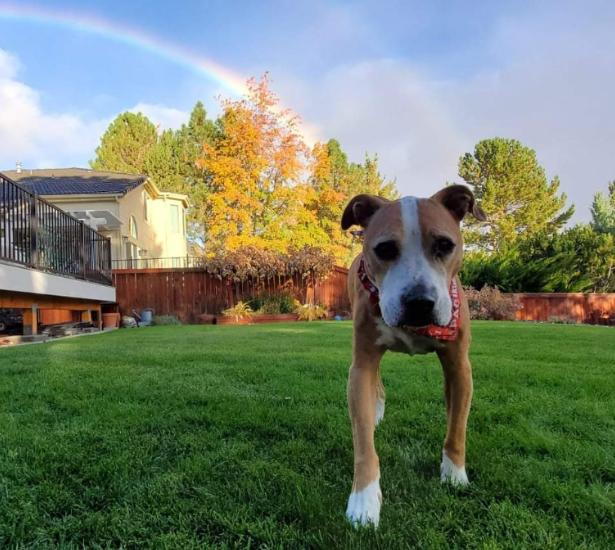
Hello there, Dr. Rasmusson here to talk about a tough but important topic – quality of life and euthanasia for our 4-legged companions. I get asked as a veterinarian “how do we know?” from families, long-distance friends and even my own husband (see header picture of our 14.5 yr-old dog, Pacino). An unnerving and abominable fact is that all of our pets will die and that their life-span is so very short compared to us 2-leggers. All of us as pet parents wish that when the time was right, our dear furry companions go to bed one night and peacefully pass away in their sleep when their suffering outweighs the good in their life; sadly, this is nearly never the case.
The word euthanasia comes from the Greek euthanatos, which means “easy death.” As veterinarians, we are exposed to euthanasia early in our training. Formulating treatment plans for our patients centers on quality of life -- alleviating suffering humanely when euthanasia can be part of that equation.
When a family pet has been diagnosed with an incurable disease or long-life has allowed non-fixable, age-related changes to occur or a horrible accident has left a pet in immense pain, part of my job and following the veterinary oath is discussing quality of life and if/when euthanasia should be considered. Our companions cannot speak for themselves and their families are charged as their caretakers – a wonderful and huge responsibility. The human-animal bond is an amazing thing – but often the last, best thing we can do as the human in this bond, is to let their suffering end humanely.
These conversations are best had within the family of the beloved pet and with guidance from a trusted veterinary professional. I have included a HHHHHMM Scale (see below): Hurt, Hunger, Hydration, Hygiene, Happiness, Mobility, More good vs bad days. Are there family routines that your beloved pet continues to enjoy? It is ok if they can’t do everything they did as a 2-year old now as a 14 yr-old, but do they still have interactions that bring them daily joy? Ideally, these family discussions are done before there is a crisis and an immediate decision is needed; ideally, we want all of the family on the same page before agreeing on an such a decision like euthanasia. I encourage families to include all family members – even children -- in these discussions; being truthful is always recommended.
Ultimately, I will console families about considering if they would want to change places with their pet. Some pet parents will talk about their pet giving them a look, that says “I am done fighting, it is ok to let me go”. If the family decision is hard, that means that the pet isn't suffering so much that it is an obvious/easy decision.
I plan on writing about the actual process of humane euthanasia and the grief that the companion 2 and 4 leggers are left with in future blog posts.
Both personally and professionally, quality of life is the foundation that I practice veterinary medicine with every day. I am grateful that my career can support my passion for the human-animal bond.
Quality of Life Scale (HHHHHMM Scale)
Using a scale of 0 to 10 (0 = Unacceptable, 10 = Excellent), patients can be evaluated for their quality of life.
Score Criterion
0-10 Hurt—Is the patient in pain, including distress from difficulty in breathing?
Can the pet’s pain be successfully managed? Is oxygen necessary?
0-10 Hunger—Is the pet eating enough? Does hand-feeding help? Does the pet
require a feeding tube?
0-10 Hydration—Is the pet dehydrated? Are subcutaneous fluids once or twice daily enough to resolve the problem? Are they well tolerated?
0-10 Hygiene—The pet should be kept brushed and clean, particularly after
elimination. Does the pet have pressure sores?
0-10 Happiness—Does the pet express joy and interest? Is he/she responsive to things around him/her (family, toys, etc)? Is the pet depressed, lonely, anxious, bored, or afraid? Can the pet’s bed be near the kitchen and moved near family activities to minimize isolation?
0-10 Mobility—Can the pet get up without assistance? Does the pet need human or mechanical help (eg, a cart)? Does she/he feel like going for a walk? Is she/he having seizures or stumbling? Note: Some caregivers feel euthanasia is preferable to amputation, yet an animal with limited mobility may still be alert and responsive, and can have a good quality of life as long as the family is committed to quality care.
0-10 More Good Days than Bad—When bad days outnumber good days, the pet’s suffering is appreciable and quality of life might be too compromised. When a healthy human-animal bond in no longer possible, the caregiver must be made aware that the end is near.
Total: A total of > 35 points is acceptable quality of life for pets.
Adapted from Canine and Feline Geriatric Oncology: Honoring the Human–Animal Bond, Villalobos A, Kaplan L—Hoboken, NJ: Wiley-Blackwell, 2007, with permission.
